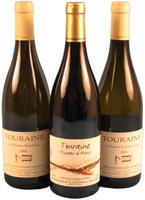Thierry Puzelat is easily one of our favorite winemakers in the Loire Valley for his ultra-conscientious production methods and complete commitment to natural wine.
Two Estates, One Vigneron
Based in Touraine (Loire Valley), Thierry bottles wine under two different labels: "Clos du Tue Boeuf" and "Thierry Puzelat."
Wines under the "Tue Boeuf" label are wines produced from grapes grown on the estate his family owns, while the wines he makes négociant-style (see sidebar) use the Puzelat moniker. Though Thierry sources fruit from other growers for the "negoc" bottlings, he is steadfast in his vow to only use fruit that meets his high organic/biodynamic standards.

Puzelat may be iron-clad in his commitment to natural methods, however, he also isn't afraid to experiment using less than traditional grape varietals. French wine laws specify certain grapes must be used to use the appellation (place) name on the label (e.g. Cheverny) but Thierry marches to his own drummer - so many of his wines garner the "lesser" vin de table or vin de pays classification.
The results of his experimentation are truly stunning. Puzelat wines exhibit a true sense of terroir while remaining totally unique and unpredictable with outrageous flavors and mouthfeel.
The production on most of Thierry's wine is so miniscule that very few of his cuveés hit U.S. shores. The few that do are absolutely incredible and should impress anyone who is up for a new experience.
![]()
2004 Puzelat Pineau d'Aunis
The staff flipped after tasting the Puzelat Pineau d'Aunis - it's easily one of the best Pineau's that we have had in quite some time.
But what exactly is Pineau d'Aunis? An obscure ancient grape varietal indigenous to Touraine (Loire Valley) that makes a killer rosé (e.g. Belliviere "Giroflees", Clos Roche Blanche). While many wines made from Pineau are rosé, daring vinters make reds that reveal a light spiciness and wonderful aromatic complexity. Puzelat's is totally outrageous with an incredible mid-palate that explodes with fruit and but finishes with minerality.
![]()
2004 Clos du Tue Boeuf Le Buisson Pouilleux
Old vine Sauvignon Blanc from Touraine ... Unlike any other Sauvignon Blanc that you can imagine. Bright light lemon with intense minerality and brilliant notes of honeysuckle, verbena and even persimmon. So exotic. Great palate coating depth - my favorite old-world Sauvignon Blanc in the store.
![]()
2004 Clos du Tue Boeuf L'Ormeau des Deux Croix
A brilliant wine made from old Chenin Blanc vines. Very substantive and ripe with lots of nutty flavors, brilliant acidity and ripe fruit. Pretty big on the palate with great persistence. A unique style of Chenin but nonetheless delicious.

Where in the World?
Home to Descartes and Balzac, Touraine is a sub-region of the Loire Valley that got its name the Celtic tribe, the "Turons," who lived in the land over 2000 years ago.
Famous for it's magnificent Chateaux, Touraine is also home to some incredible wine, the most well-known are made from Chenin Blanc in the appellations of Vouvray and Monlouis or Cabernet Franc in Chinon and Bourgeuil.
Other popular varietals include Gamay, Sauvignon Blanc, Malbec (known locally as Cot), and of course Pineau d'Aunis.
What is a Négociant?
A négociant buys either grapes or juice that she didn't grow herself in order to make more wine than she could possibly produce with her own vineyard holdings, most times because demand for the wine outstrips supply.
In Burgundy, large famous négociants such as Drouhin and Jadot source fruit from around the region to make their ubiquitous cuveés. Other well known négociants you might be familiar with are Guigal (Rhone), Duboeuf (Beaujolais), and Veuve Cliquot (Champagne).
Many of these uber-producers compliment their well-marketed wines with their own "Domaine" bottlings, which are much smaller in production and are made from the grapes that are grown on land that the winemaker actually owns.
While many négociants operate as corporations, a few smaller growers like Thierry Puzelat just want to make more new and different wine than the plots of their families can supply.
